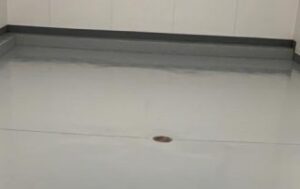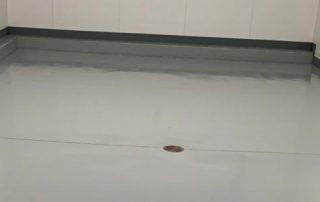Cons of Installing Epoxy Flooring

If you’re looking for a new flooring material for your home or business in Phoenix, you may be overwhelmed with all of the options. Carpet, tile, hardwood, laminate… the list goes on and on. But have you considered epoxy flooring?
Epoxy is a type of resin that can be applied to concrete floors to create a durable, long-lasting finish. It’s become a popular choice for many homeowners and businesses due to its low maintenance requirements and resistance to staining and fading.
However, like all flooring materials, epoxy has its pros and cons. In this article, we’ll explore the pros and cons of installing epoxy flooring so you can decide if it’s the right choice for your home or business.
What is an Epoxy Floor Coating?
An epoxy floor coating is a type of resin that is applied to concrete floors to create a durable, long-lasting finish. It’s become a popular choice for many homeowners and businesses due to its low maintenance requirements and resistance to staining and fading.
Epoxy coatings are typically made up of two parts: the epoxy resin and the hardener. When these two parts are mixed together, they chemically react to form a rigid plastic material. This plastic material can then be applied to concrete floors to create a smooth, glossy finish.
Where is Epoxy Typically Used?
Epoxy is most commonly used in commercial and industrial settings, such as warehouses, factories, and retail stores. However, it is also becoming increasingly popular for use in residential homes. Some of the most common installation areas for epoxy flooring include:
-Garages
-Basements
-Patios
-Driveways
What are the Pros of Epoxy Flooring?
There are many advantages to choosing epoxy flooring for your home or business. Some of the most notable benefits include:
1. Durability: One of the biggest advantages of epoxy floors is their durability. When properly installed and cured, epoxy floors can last for decades without showing signs of wear and tear. They’re also resistant to staining, fading, and scratching, making them ideal for high-traffic areas.
2. Low Maintenance: Epoxy floors are very easy to keep clean and require little maintenance. Unlike carpet or hardwood floors, there’s no need to vacuum or sweep epoxy floors on a daily basis. A simple weekly mopping is all that’s needed to keep them looking like new.
3. Slip-Resistant: Epoxy floors are slip-resistant, making them safe for both commercial and residential settings. This makes them ideal for areas where there is a risk of water or other liquids being spilled, such as kitchens and bathrooms.
4. Easy to Install: Epoxy floors are surprisingly easy to install, even for DIYers. Most epoxy kits come with everything you need to get the job done, including detailed instructions.
5. Affordable: Epoxy flooring is one of the most affordable flooring options on the market. It’s also much cheaper to install than other flooring materials, such as hardwood or tile.
What are the Cons of Epoxy Flooring?
While epoxy floors have many advantages, there are a few potential drawbacks to be aware of before making a purchase. These disadvantages include:
1. Costs: The initial cost of epoxy flooring can be higher than other flooring options. However, it’s important to keep in mind that epoxy floors are very durable and will last for many years, so the long-term costs are often lower than other materials.
2. Installation: Epoxy floors must be installed by a professional in order to achieve the best results. While DIY installation is possible, it’s not recommended unless you have experience working with epoxy.
3. Maintenance: Although epoxy floors are easy to maintain, they’re not completely maintenance-free. For example, they may need to be resealed every few years to keep them looking like new.
4. Shiny, Reflective Surface: One potential downside of epoxy floors is that they can be very shiny and reflective. This can be a problem in commercial settings where bright lights are used, such as factories and warehouses. It can also be an issue in homes with plenty of natural light.
5. Temperature Sensitivity: Epoxy floors can be sensitive to extreme temperatures. During hot weather, the epoxy may soften and become sticky. In cold weather, the epoxy may become brittle and crack.
Should You Install Epoxy Flooring in Your Home or Business?
If you’re looking for a durable, low-maintenance flooring option, epoxy flooring may be the right choice for you. It’s important to weigh the pros and cons before making a decision, as epoxy floors are not right for everyone.
For example, if you’re looking for a wide range of color options, epoxy floors may not be the best choice. However, if you’re looking for a durable, easy-to-maintain floor that will last for many years, epoxy flooring may be the perfect solution.
Always Avoid DIY Epoxy Flooring Kits
While it is possible to install epoxy floors yourself, it’s not recommended unless you have experience working with this type of material. If you’re not sure how to properly mix and apply the epoxy, it’s best to leave the job to a professional.
If you decide to install epoxy flooring yourself, be sure to follow the instructions included with your kit carefully. Otherwise, you may end up with an inferior product that doesn’t last as long as it should.
Also, be aware that most DIY epoxy kits only cover a small area, such as a single room or garage. If you need to cover a larger area, you’ll need to purchase multiple kits or hire a professional.
Hiring a Professional to Install Your Epoxy Floor
If you decide to hire a professional to install your epoxy floor, be sure to do your research first. Not all flooring contractors are created equal, and some may not have experience working with epoxy.
When searching for a flooring contractor, look for one that specializes in epoxy flooring. Be sure to read online reviews and ask for referrals from friends or family members who have had epoxy floors installed in their homes or businesses.
Once you’ve found a few reputable contractors, be sure to get written estimates before making a final decision. This will help you compare the costs of different contractors and ensure that you’re getting the best value for your money.
If you are local to the Phoenix area, reach out to our team of dedicated and experienced flooring professionals. We specialize in epoxy flooring and can help you choose the right product for your needs.
We understand that every home and business is different, and we’ll work with you to find the perfect solution for your space. Contact us today to learn more about our epoxy flooring options or to schedule a free consultation.
FAQs
What is Epoxy Flooring?
Epoxy flooring is a type of resin that is applied to concrete floors to give them a durable, long-lasting finish. It’s popular for its low maintenance and resistance to staining and fading.
Where is Epoxy Flooring Typically Used?
Epoxy flooring is popularly used in commercial and industrial settings like warehouses and factories. However, it’s also gaining popularity for residential use in garages, basements, patios, and driveways.
What are the Best Things about Epoxy Flooring?
Epoxy flooring is known for its durability, low maintenance, and slip resistance. It’s also easy to install and is one of the more affordable flooring options available.
Are There Any Downsides to Epoxy Flooring?
While epoxy flooring has many benefits, it also has some drawbacks. These include higher initial costs, the need for professional installation for best results, and sensitivity to extreme temperatures.
Is DIY Installation of Epoxy Flooring Recommended?
Although it’s possible to install epoxy flooring yourself, it’s generally not recommended unless you have experience with the material. Incorrect mixing and application can result in an inferior product

